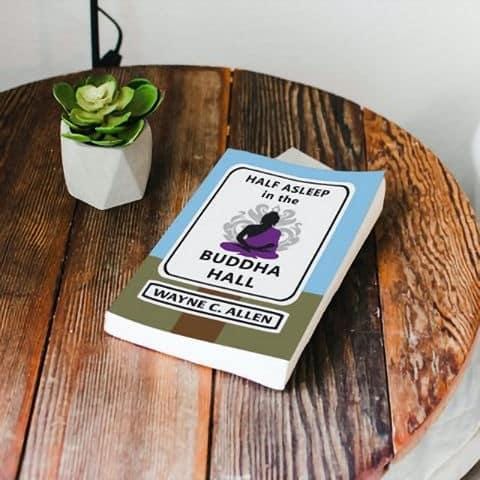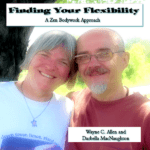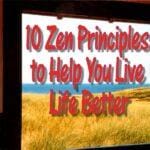- Zen 101 — Essential Zen Lessons
- Zen 101 — More Zen Ideas
- Zen 101 — Self-Responsibility
- Zen for the Holidays — 10 Tips
- Zen and Clarity — Zen Principles
- Zen and Innocence — Zen Principles
- Zen and Clinging — Zen Principles
- Zen and Karma — Zen Principles
- Zen and Emotional Balance — Zen Principles
- Zen and Simple Presence — Zen Principles
- Zen Living: 5 Ways to Land
- The Emptiness of Everything
Zen and Clinging — Clinging is what causes suffering, or so said the Buddha. This idea is not so hard to understand, until we are… well… suffering. Then, we just want it to be over. And that’s how we go off the rails.

Looking for more on this topic?
Check out my book,
Half Asleep in the Buddha Hall.
My “Eastern” book takes you by the hand and helps you to find peace of mind.
Half Asleep in the Buddha Hall is a Zen-based guide to living life fully and deeply.
(Here’s a direct Amazon link)
Purchase digital versions (Apple, Nook, Kobo, etc.) from this page
Most people are plagued with clinging.
Clinging is “grasping onto.” We can grasp on to an actual thing, or to an idea. We can also grasp on to “aversion” — to not wanting something. In general, clinging us about identifying with ideas — “this is me, this is not me.”
Something I cling to might be called the “object of my desire.”
Zen attempts to loosen our fingers from the death-grip we have on the object(s) of our desire, so that we can accept the final paradox of our desire – you can never hold on to anything, including our illusions.
The problem is simple — clinging demands that my desire should trump my reality.
Many of us are quite capable of being present — when all is well and the creek ain’t rising. Difficulties happen when we face a reality that differs from what we imagine we want.
It’s like the old joke: The 8‑year-old speaks for the first time: “Mom! The toaster is on fire!” Mom’s amazed: “Why has it take you so long to speak?” Kid: Everything was alright until now.”
Zen, too, seems kinda easy, right up until something goes wrong: illness, death, someone leaves you… Then, it’s: “This is not satisfactory! I want this to be over!”
Let’s start by having a look at desire, shall we?

There’s a book by Mark Epstein called “Open to Desire.” Epstein is a Buddhist psychotherapist, and was a student of Ram Dass.
Obviously, the subject of the book is desire, and how Buddhism has a bit of a split personality about it. We do too, of course.
Desire, like sex, makes many people uncomfortable.
We like it that things can and do “turn us on,” but we also realize that turn-ons have “power over us.” And turn-ons mean that there are turn-offs; things that we don’t want. They’re still desires, or better, anti-desires.
Epstein describes two paths in Buddhism.
- The ‘right hand path’ as that of the ascetic. In this view, all desire leads to trouble (suffering)… and the way to deal with it is to repress it, fight it, ignore it, or meditate it to death.
- The ‘left-hand path’ is Tantra. In this view, desire becomes the energy for transformation. Desire stands in the gap between what we have and what we want.
There are several things going on here at once, and they’re all contradictory.
First, desire is a function of objectification.
One of the exercises featured in my book, This Endless Moment is to go to a Mall or a beach or some place where lots of people are. Sit there and watch the people go by, and notice which people you are attracted to. Just notice.
If you do this with your partner, tell him or her what you are learning about yourself.
Just below the surface, we all crave, or desire, “others.” Here is the first paradox.
- In order to desire, I have to create an-other — an “object of my desire.”
- In order to desire, I have to see the object while holding it as a thing.
The paradox is that full-blown desire only happens when I objectify. As soon as the object becomes a person, as soon as I give the object subjective reality, (I recognize the person) the charge… the desire to fade.
Second, desire is an internal mental process — the object of your desire is inside of you.
This is part of the point of the observation exercise. You judge someone to be desirable. Another person, sitting next to you, might not think so. Thus, the person observed is NOT desirable (it’s not a characteristic of the person); you desire the person.
As you take a step back, you realize that there is a gap between what you desire and the reality of the object. The paradox is that you want to possess and hold on to something you are imagining… (the real issue is, as we shall see – clinging…) – but the reality of what you are trying to hold on to has a mind (or a nature) of its own.
Epstein writes:
“But this kind of satisfaction is impossible because the qualities that we project onto the desired object — of permanence, stability or “thingness” — do not really exist… The disparity between the way we perceive things and the way they actually are is at the root of our struggle with desire. Once we learn to make that disparity part of our experience, however, desire can be a teacher rather than an affliction.” [p 69]
The Buddha’s first teaching is called “The Four-fold Path.” This teaching supposedly happened pretty much right after his enlightenment, and discusses his major insight — that desire (or better, clinging to desire) leads to suffering.
The Buddha thought that our propensity for creating suffering was so common that his First Truth was, (as it is typically translated in English) Life is Suffering.
Epstein says that the Sanskrit dukkha, (the word usually translated ‘suffering’) actually means something closer to “pervasive unsatisfactoriness.”
An example of dukkha is a potter’s wheel that is off-balance, and therefore continually squeaks.
When you are miserable, isn’t that what life feels like — like something’s not quite right, annoying, irritating, anger-provoking?
The problem comes when we feel this sense of dukkha, and then blame the experience on persons, places, or things outside of ourselves. We blame others (or our situation — pain, etc.) for creating the feeling we have inside of us, despite at some level knowing that our feelings are always and exclusively an inside job.
The second Noble Truth: “Clinging (to misplaced desires) causes Suffering.”
The Buddha was a pretty good psychotherapist, and he spent his life describing elements of this dance. What he determined was that desire in and of itself is not an issue. Clinging to the thing we desire is the issue.
We cling to what we imagine we want, as opposed to being with (desiring) what we have. We create dukkha when we prefer our imaginings over reality, which is how suffering happens.
The place where desire exists, however, is also the place where we can begin to step out of the world of things. As we allow the “things we desire” to just be — to become real, separate and subjective, we can embrace both their separateness and their deeper meaning.
Now, that’s not what we think nor how we normally act. We label everything, and most especially do we judge everything.
Thus, it might be said that all suffering comes from our attachment to what we think someone (or some thing, more precisely) ought to be, as opposed to learning to deepen our desire for how “it” actually is.
The same thing happens at the intra-personal level, as we objectify our lives.
- This time was better than that time.
- This experience is preferable to that experience.
- This is a good desire, that is a bad desire.
In each case, I am creating a straw person who is leading a life other than the one I am experiencing, and I cling to my desire for that (unreal) reality.

Of course, if I am sick, I’d rather not be. I can easily remember all the times I felt ‘better,’ and boy do I desire that “other” feeling.
But this simply leads to compounding my pain with my imagined suffering .
A way to think of this is that pain is inevitable: things we want won’t happen, things we don’t want will, and the bodily reaction is pain. The Buddha patiently explained, however, that suffering is always optional.
Ram Dass used this illustration at a workshop: “Imagine that you have to have burning coal placed on the palm of your hand. This is pain. The question is: will you hold it loosely, (non-clinging) or will you grasp it tightly (suffering) and burn your entire hand?”
Not easy, this, because when we hurt, we want “it” to go away. To change. To be different. And yet, each thing has its own time-frame, and doesn’t care what we want.
If we deal with the pain “as it is,” we do not suffer. If we focus on what we aren’t getting, and demand change, at the very least, we are disappointed.
The way though is being passionate about only one thing. This Present Moment.
Passion is the way to open ourselves to encountering the other (person, place, thing, experience) as real. This type of relating is an internal decision to be passionately engaged in an exploration of the gap that exists between myself and that which is other. I also explore the gap between another and my perception of the other.
So, what is the gap, and how does it parallel desire?
The gap is created by the space (and the emotional tension) between what is happening and what I wish would happen.
In most cases, this tension creates desire – a longing for ‘what isn’t.’ This desire is either positive — “I want what I don’t have,” or negative — “I don’t want what I do have.”
Where most go off the rails is when they freak out over the tension. They endlessly try to “make-over” the person or situation – the ‘object’ of their desire – into the image they have in their heads.
To state it again — the desire for something “other” is normal. The demand that “that which is desired” become real — that what I desire internally be created in the world — simply because I imagine it to be “better” — is clinging — which leads to suffering.
Clinging to one’s demand for “what I am imagining” leads to ‘spending one’s life fighting the gap.’ A desire that one obsesses over leads to misery. If I ‘fixate’ on fulfilling my desire, I will never have a moment’s peace.
- The ‘right hand path’ suggests dealing with our propensity to cling by rejecting or renouncing desire.
- The left hand path, the way ‘through’ desire, is to accept it, respect it, and use it to work with the gap.
So, what does this look like?
Oddly, it’s as simple as acceptance. I accept that nothing stays the same, that there is always a gap between what is and what I desire, and I use this tension to relax into being comfortable with my discomfort. What is will soon be something else. Obsessing about it (“You! Change NOW!”) simply means I cling to my desire, and I suffer.
The best description is this (repeat as a mantra, if you will):
I am who I am, and my discomfort is a part of that. If I observe it as opposed to clinging to it and pretending it’s real (it’s not – it’s a figment of my imagination), the distress will lead me to notice what I am doing, and allow me to step away from doing to simply ‘being in the moment.’
Life is in endless tension. That is the nature of life. The way through the tension is to simply be present with it in a non-grasping way.
Once I see that life is as it is, I can learn to be in my life, as opposed to trying and failing, endlessly, to fix it, either in time, or by making everything over in the way I want it to be.
Once I stop trying to play god, in other words, I can simply be me.
Like I have another choice…





